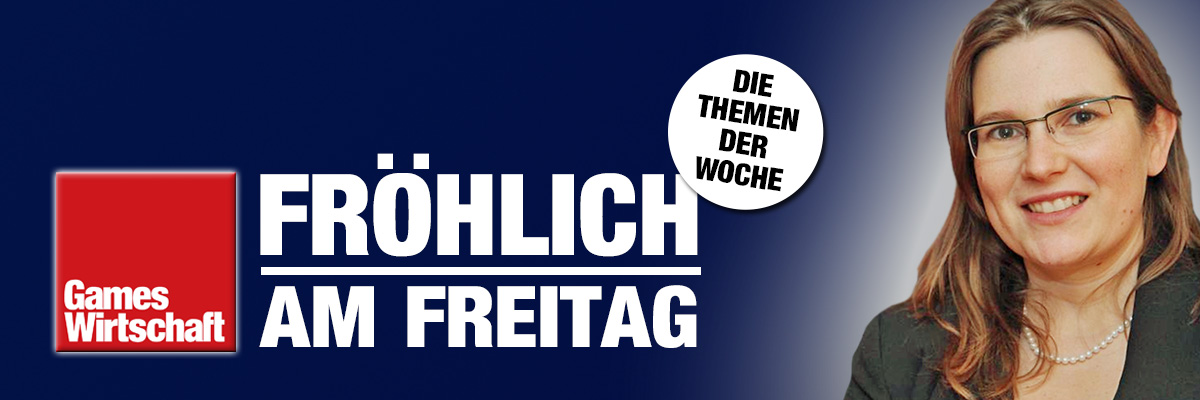At what point is it legitimate to assess the effectiveness of games funding – and why isn’t the answer “Saktnimmerleinstag”?
Dear GamesWirtschaft reader,
Dear GamesWirtschaft reader,
In my most recent Good Friday sermon, I suggested something that felt self-evident, but from the point of view of some readers was downright improper: namely transparency about what happens with the €100 million in tax money that the chronically cash-strapped federal government has approved for subsidizing video games since 2019.
In the pilot phase alone, 27 million euros were distributed – 90 percent of those 230 projects have long been official “closed”and that has mostly been the case since 2020. There are also federal states that have invested tens of millions in regional game studios over the past decade and a half.
No municipality would be allowed to get away with it if the town hall was overwhelmed with the question, whether the expensive bike path was ever paved to the end or not. However, when asked, ministries and institutions keep to themselves whether the subsidized concepts, prototypes and other projects have led to market-ready products. A regular, public what-has-brought-cash crash does not take place.
In the column, I was not so much concerned with the sense and design of state market interventions (which was also worth talking about), but first and foremost with some kind of comparison of reality. Right from the start – and not just in 2026, when the last funded game has rolled off the assembly line.

In any case, a surprising number of readers used the Easter weekend to hack their resentment into the keyboard. Tenor: How could it be that such demands were made in an industry magazine of all places – when the industry had fought like a lion for years a) for recognition and b) funding? What should people think?
The contradiction to the column was partly of a very low-threshold nature. Some people were already bothered by the wording “subsidy” in connection with the chubby computer games guild – probably because “Financial support” just sounds a lot cuddlier in the context of match-3 innovations. Each applicant signs a punitive statementin which it is already stated verbatim under point 3: “The requested funds are subsidies.”
And now I don’t know either…
Between the lines, the expectation shimmered through comparatively bluntly that at least the trade press was somehow also part of the industry – and should therefore play a very friendly role, please.
To put it politely: I am afraid there is a very fundamental misunderstanding here.
That he for and about A branch reports that yes (hopefully) doesn’t mean that one is by default With common to the industry or even hides contradictions. For example, if you were to shrug your shoulders if future ESL and DreamHack events in Cologne and Hanover paid directly into Saudi Arabia’s account and image, then that would have very little to do with journalism, but a lot with PR.
Besides that it’s something like “the industry” there is no such thing as funding or training and further education anyway: The economic interests of Ubisoft, Kalypso or THQ Nordic, which maintain studio subsidiaries all over the country, are diametrically different from those of Nintendo or Square Enix or Sony or Microsoft or Electronic Arts, where the Federal Republic of Germany now acts as a fortunately potent sales market .
But because the topic hasn’t left me alone, I’ve been asking editorial specialists and executives in the past few days how they think about their professional ethics. In other words, whether they see themselves as part of the industry – and consequently row in the same boat as developers, publishers, marketers, agencies and associations.
Result of the rather unrepresentative poll: Slightly more than half dismissed the thought alone with outrage. Some see themselves in a both-and-role because they act as service providers or organizers, at least temporarily. And of course there are those who are related to the question “Sure, of course” answer – also because they know about mutual dependencies (no code, no test).
There is no question that the cleanest possible separation was, is and will remain a constant challenge. For a start, it would certainly help with a view to internal hygiene if publishers and media did not do this in the first place paying member a professional representation like the game should be – like the German Association of the Automotive Industry (VDA), for example, manages.
After seven days of inner contemplation and intensive exchange – also with those receiving funding – I am still convinced: An industry that is provided with a quarter billion euros by politicians, but at the same time (mis)interprets transparency as distrust, will have a problem along the way.
One can only hope that the federal and state governments will quickly develop suitable reporting – namely, before the taxpayers’ association asks. Or Frontal 21. Or Mario Bart.
Have a nice weekend
Petra Happy
Editor-in-Chief GamesWirtschaft
Always on Fridays, always free: Subscribe to the GamesWirtschaft newsletter now!
The post Trust is quite good, but so is control (Happily on Friday) appeared first on Gamingsym.
